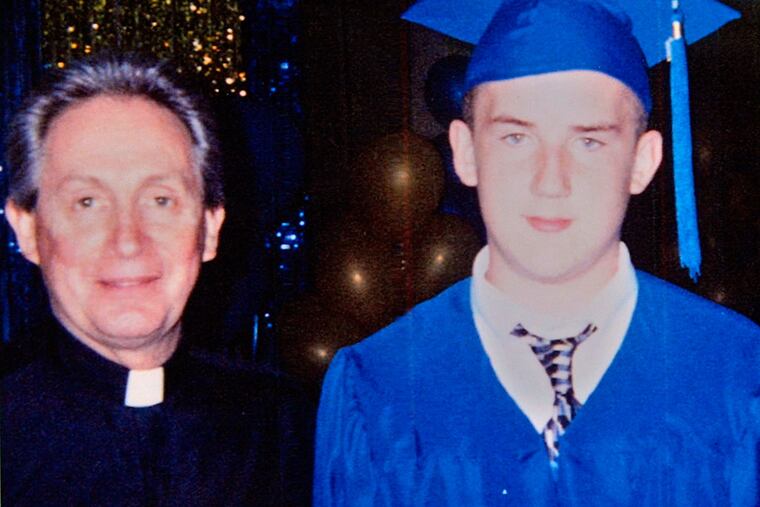Federal prosecutors find a way to revive abuse-related case against defrocked Philly priest
The former Northeast Philadelphia priest, Robert L. Brennan, has been indicted for lying to the FBI about his relationship with the family of Sean McIlmail, who had said the priest had molested him starting when he was 11.

Six years ago, prosecutors in the Philadelphia District Attorney’s Office filed child-abuse charges against a Catholic priest, Robert L. Brennan, only to see their case collapse in less than a month after his accuser was found dead from an accidental drug overdose.
The collapse hit especially hard because a pair of grand jury reports said Brennan had victimized as many as 20 youngsters, making him one of the region’s worst abusers. Yet case after case had been ruled out as too stale under Pennsylvania’s tough statute-of-limitations rules — until Sean McIlmail leveled his accusations.
Now, six years after McIlmail’s death, Brennan, who was defrocked in 2017, faces a new set of criminal charges from a new set of prosecutors.
Pursuing a novel legal strategy, federal authorities on Thursday charged Brennan with a fresh crime. Rather than indicting him for allegedly abusing McIlmail two decades ago, they charged him with four counts of lying to the FBI this year, saying he falsely denied knowing McIlmail or his brother and his churchgoing parents.
The case is the first brought since Philadelphia’s U.S. Attorney William M. McSwain launched a year ago an investigation into clergy abuse across Pennsylvania, an unprecedented move for a federal prosecutor.
Zach Hiner, executive director of Survivors Network of Those Abused by Priests (SNAP), praised McSwain for finding a creative way to charge Brennan with a federal crime.
“It’s an exciting thing for survivors to see. It lets them know their reports were not made in vain,” Hiner said. “This action can give survivors hope there might be a chance for justice for them.”
A handcuffed Brennan, 81, was brought into a federal courtroom in Philadelphia for his arraignment Thursday afternoon, hours after his early-morning arrest at his home in Perryville, Md., near the Pennsylvania line. Brennan, wearing a maroon T-shirt, beltless khaki pants, and tasseled loafers, pleaded not guilty and said he was too poor to hire his own lawyer. He was ordered to stay at home to await his trial.
Brennan faces a maximum statutory sentence of 32 years if convicted on all four counts. However, advisory federal guidelines call for a sentence of no more than two years and nine months for this kind of lying.
In 2005, the first of the two critical Philadelphia grand jury reports described Brennan as a serial sexual predator who molested about 20 boys as he was moved from one Philadelphia-area parish to another from the late 1980s to the early 2000s. During his stays in church-run mental hospitals, church leaders told parishioners he was “on retreat” or being treated for Lyme disease.
But until McIlmail came forward, all the allegations against Brennan were too old to prosecute. With McIlmail’s testimony in hand, then-District Attorney Seth Williams filed sexual assault charges against the former priest. But McIlmail, 26, who had long battled addiction, was soon found dead in a car in Kensington of a heroin overdose. The District Attorney’s Office was forced to drop the case.
Brennan’s arrest Thursday was the first to emerge from the wide-ranging inquiry McSwain launched last fall into clergy sex abuse and cover-ups in dioceses across Pennsylvania. McSwain acted after Pennsylvania Attorney General Josh Shapiro made public a sweeping grand jury report leveling abuse accusations against more than 300 priests.
McIlmail alleged that Brennan had raped and molested him from 1998 to 2001, starting when he was 11, at Resurrection of Our Lord Parish in Northeast Philadelphia’s Rhawnhurst section. The abuse allegedly took place in the church vestry, in Brennan’s rectory bedroom, in a parish storage area, and in a movie theater.
After McIlmail’s death, his parents, Michael and Deborah, pursued a lawsuit against the Philadelphia Archdiocese. The suit settled last year, one of only seven to result in payments, a reflection of state law that limits suits.
In pursuing the civil case, attorney David K. Inscho of the Center City firm Kline & Specter appeared to have laid much of the groundwork for the federal criminal charges.
In talking with the FBI last April in Maryland — he did so voluntarily, as no law compels citizens to speak with agents — Brennan denied knowing Sean McIlmail or his older brother, Michael, an altar boy. However, the McIlmail family has photos taken at parish eighth-grade graduations showing the two boys posing with Brennan.
In his deposition, Brennan denied abusing Sean McIlmail or anyone else. As for the photos, he said he didn’t know the boys and had posed for “probably hundreds and hundreds and hundreds” of graduation pictures.
Brennan also said he did not know Sean’s parents, who were active members of the Resurrection parish. In a separate deposition, the Rev. William Kaufman, the pastor at the church during Brennan’s decade there, disputed Brennan about that.
Told that Brennan said he did not know Sean McIlmail either, Kaufman testified, “I do not believe that.”
Inscho said Thursday the indictment demonstrates how a civil case can drive a criminal one. “It shows the importance of civil litigation to bring these facts to life,” the lawyer said. “These cases get brought, and people are forced to answer questions under oath.”
Although unusual, the federal arrest of the former priest was not unprecedented. In 2014, federal prosecutors in Philadelphia charged the Rev. Mark Haynes with possession of child pornography. At his sentencing, former parishioners testified that he had abused them. Haynes is now serving a 20-year sentence.